Donald Trump
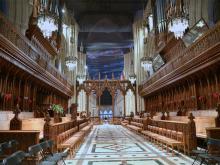
Washington National Cathedral was founded in 1907 and envisioned as a “Westminster Abbey for America,” which, in part, is why it finds itself at the center of controversy about its role in President-elect Donald J. Trump’s impending inauguration.
For more than a century, the cathedral has tried to stand in two worlds at once, attempting to be both a practicing Christian church and a gathering place for American civic expression. As the cathedral’s former dean, I believe that fidelity to the former role now requires rejecting the latter.

More than 800 congregations have declared themselves sanctuaries for undocumented immigrants, about double the number since Election Day.
Leaders of the sanctuary movement say the pace of churches, and other houses of worship, declaring themselves sanctuaries has quickened, in the days leading up to the inauguration of President-elect Donald Trump on Jan. 20.
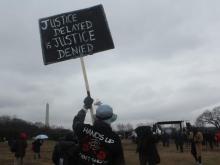
Crying out “no justice, no peace,” crowds joined the Rev. Al Sharpton in a weekend march towards the Martin Luther King Jr. Memorial, vowing not to let President-elect Donald Trump turn back strides made by the civil rights leader.
The mostly African-American throng — smaller than the thousands expected, due to the steady rain — heard from civic and religious leaders about key areas of concern: health care, voting rights, economic equality, and police brutality and reform.
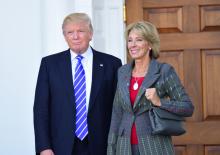
Later today U.S. Senate confirmation hearings begin for Betsy DeVos, President-elect Donald Trump’s pick to lead the Department of Education. If confirmed DeVos will lead the primary government agency tasked with establishing policy and administering most federal funding for public education and enforcing federal educational laws regarding civil rights.
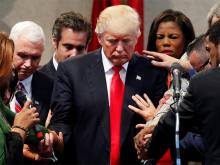
“God raised up, I believe, Donald Trump,” said former U.S. Rep. Michele Bachmann after he won the GOP nomination. “God showed up,” the Rev. Franklin Graham said to cheers at a post-election rally. “God came to me, in a dream last night, and said that Trump is his chosen candidate,” said the televangelist Creflo Dollar.
For those who share this view, Trump’s victory was nothing short of miraculous, especially given that he beat out 16 other in the Republican primaries — some of them evangelical Christians with long political resumes.
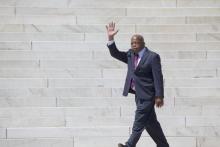
On Jan. 13, Georgia Rep. John Lewis — civil rights icon who was beaten on the Edmund Pettus Bridge in Selma, Ala., marching for voting rights for African Americans in 1965 — said he would not be attending President-elect Donald Trump's inauguration, a first for the longtime congressman since serving. Trump took to Twitter the morning on Jan. 14 to attack Lewis.
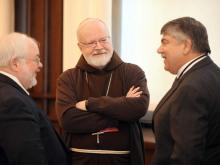
For much of its long history in the U.S., the Catholic Church was known as the champion of the working class, a community of immigrants whose leaders were steadfast in support of organized labor and economic justice – a faith-based agenda that helped provide a path to success for its largely working-class flock.
In recent decades, as those ethnic European Catholics assimilated and grew wealthier, and as the concerns of the American hierarchy shifted to battles over moral issues, such as abortion and gay marriage, traditional pocketbook issues took a back seat.
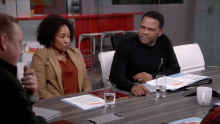
“You don’t think I care about this country?” asks Dre, an African American character played by Anthony Anderson, on the television show black-ish, in the Jan. 11 episode “Lemons.”
“I love this country, even though at times it doesn’t love me back.”

At least 16 Jewish community centers received bomb threats on Jan. 9, in an apparent attempt to rattle American Jews, who have seen a spike in anti-Semitism incidents in the past year.
The threats — some by live callers, some by robocall — were made to JCCs in Florida, Maryland, New Jersey, Tennessee, South Carolina, and at least four other states.
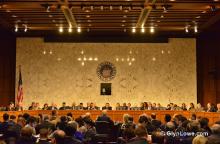
On Jan. 11 the Senate confirmation hearing for former Exxon Mobil CEO Rex Tillerson, for the office of Secretary of State, began, reports NPR. In his hearing Tillerson admitted to the Senate Foreign Relations Committee that he has yet to discuss with President-Elect Trump U.S. foreign policy as it regards to Russia.
He also made a statement that seemed in partial opposition to the use of sanctions against Russia and other countries, stating that they “are going to harm American businesses.” However, he relented to the idea that sanctions have the ability to be a “powerful and important tool.”
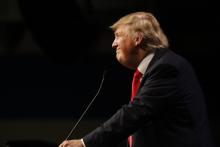
He referred to himself as “the greatest job producer that God ever created.”

Sessions has long been, in the words of one prominent immigration advocate, the “most anti-immigrant senator in the chamber.” When George W. Bush, a self-styled “compassionate conservative” and born-again Christian, pushed a comprehensive immigration reform bill in 2007 that was supported by many business and law-enforcement officials, Sessions railed against what he called the “no illegal alien left behind bill” and led the charge against the failed effort. “Good fences make good neighbors,” he said at a press conference the year before.

Rogue One meets us where we are. In a divisive time, when prejudice reigns with renewed power and threatens a destructive future, and where unquestionably moral leaders can be hard to come by, those of us seeking to faithfully resist injustice would do well to look to Rogue One for what it has to teach us

Power always produces accommodation, and already Trump is being normalized by the media and political world — with the elites adjusting to the new situation of power as they always do Celebrity has replaced leadership, chest pumping has replaced unifying, tweeting has replaced press conferences and international policymaking, and profiteering looks to become a presidential business. The president-elect’s denials of facts — like intelligence community reports of Russian intervention in an American election — are breathtaking.

Huston Smith, the man who helped the world understand other faiths, perhaps more than almost anyone else, died on Dec. 30 at age 97.
I first learned of it when my oldest sister, who lives in Berkeley, Calif., not far from Huston and Kendra Smith, sent me a note saying he had breathed his last about 7:30, the morning of Dec. 1, at his Berkeley home.
I was surprised that it took until Jan. 1 for a news story to show up about the death of this remarkable religion scholar.
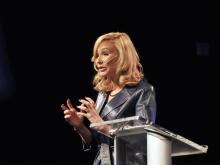
White, an early and enthusiastic Trump backer, organized national gatherings of evangelical leaders on his behalf, and spoke at a Trump rally on the campus of the University of Central Florida. She also delivered the benediction on the first night of the Republican National Convention in Cleveland.
White will be only the second woman to pray at an inauguration. And, together with Bishop Wayne T. Jackson of Great Faith Ministries International, who will deliver another of the inaugural benedictions, she will be among the few outspoken advocates of the “prosperity gospel” to appear at an inaugural in recent memory.
1. The Man Who Saved 200 Syrian Refugees
Would that the world’s leaders felt the same: “I didn’t want to be 80 years old and know that I did nothing during the greatest humanitarian crisis of my time.”
2. Merry Christmas! The North Pole Is 50 Degrees Warmer Than Usual …
“No word from Santa on the forecast — or from President-elect Donald Trump, who is exercising his Twitter fingers while the Arctic melts.” XOXO, Grist.org
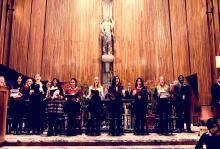
Our only hope is that light does come into the darkness, that this child born in an animal stall is still more important than all the kings and rulers, that the “lowly” are closer to God than all the “high”-placed people that we are forced to watch and listen to all the time. I needed last night to remind me again.
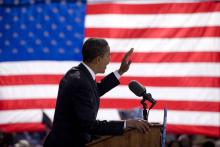
President Obama's administration will formally end a registry program created after 9/11 to monitor visitors traveling to the U.S. from countries with active terrorist groups, reports the New York Times. This move comes weeks before the inauguration of President-elect Donald Trump, who made known during his presidential campaign his intent to set up a national registry for Muslims and temporarily ban Muslim immigrants from the U.S.

Let us not forget the impact that D.W. Griffith’s The Birth of a Nation had on America when it was released in 1915. An adaptation of the novel The Clansman: A Historical Romance of the Ku Klux Klan, there’s little doubt in my mind that the film’s racist depictions of African Americans and affirming depictions of Klansmen formed and hardened the discriminatory beliefs of many white people in the U.S., making them further believe that black people were undeserving of fairness, respect, and freedom. The Birth of a Nation is a prime example of why we need new stories, told from the perspective of identities that are generally ignored and denigrated.